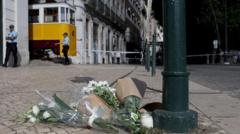Who Are the Victims in This Case?

Published: 2025-09-04 10:56:06 | Category: technology
Portugal is grieving following a tragic incident involving the derailment of Lisbon's iconic Glória funicular cable railway, resulting in at least 17 fatalities and around 20 injuries. The victims included both locals and foreigners, with the identities of many yet to be confirmed. This accident has raised concerns about safety and the transport system in one of Europe's most popular tourist destinations.
Last updated: 25 October 2023 (BST)
Key Takeaways
- At least 17 people have died, including a transport worker.
- Injuries reported involve 20 individuals from various countries.
- The Glória funicular is vital for both tourists and local residents.
- Emergency services are still assessing the situation and confirming identities.
- The UK Foreign Office is prepared to assist any British nationals involved.
Overview of the Incident
On Wednesday evening, the Glória funicular cable railway in Lisbon derailed, leading to a devastating outcome. Among the deceased were seven men and eight women, with both Portuguese and foreign nationals confirmed as victims. The incident has prompted an outpouring of grief and sympathy from the local community and beyond.
Details of the Victims
As authorities work to identify the victims, initial reports indicate a mix of local residents and foreign tourists were aboard the funicular at the time of the crash. Margarida Castro Martins, head of Lisbon's Civil Protection Agency, provided information that among the injured, 12 women and seven men aged between 24 and 65 were treated for various injuries. A notable aspect of this tragedy is the involvement of a family from Germany, where the father died, and the mother is reported to be in a critical condition.
The Role of the Glória Funicular
The Glória funicular is an essential piece of Lisbon's transport network, connecting the lower streets of the city with the higher elevations where many residents live. It serves not only tourists seeking panoramic views of the city but also locals relying on this mode of transport for their daily commutes. The funicular can accommodate approximately 40 passengers, making it a popular choice among those navigating the steep streets of Lisbon.
Response from Authorities and Unions
In the aftermath of the incident, transport unions and local government agencies have expressed their condolences to the victims' families and friends. Sitra, the Portuguese transport union, confirmed that André Jorge Gonçalves Marques, a brake guard on the funicular, was among those who lost their lives. This highlights the personal toll the accident has taken on the community, especially among those who work in the transport sector.
Investigation and Safety Concerns
The investigation into the cause of the derailment is underway, with authorities examining factors that may have contributed to the accident. As details continue to emerge, there are growing concerns regarding the safety of funicular systems and other forms of transport in Lisbon. The city's unique topography presents challenges, and ensuring the safety of passengers is paramount.
Emergency Services' Ongoing Efforts
Emergency services swiftly responded to the scene, with reports of multiple injuries being treated at local hospitals. As of now, the total number of individuals aboard the funicular is still unclear. The emergency response underscores the importance of preparedness in managing such crises, particularly in busy urban areas frequented by tourists.
Impact on the Community and Future Implications
The Glória funicular's derailment not only affects those directly involved but also resonates throughout the Lisbon community. The loss of life and injuries sustained have left many in shock, raising questions about the safety of public transport systems. In the coming weeks, discussions are likely to emerge regarding potential reforms or heightened safety measures in the city's transport infrastructure.
Potential Changes to Safety Regulations
As investigations proceed, it is anticipated that there may be calls for stricter safety regulations for cable cars and funiculars across Portugal. Transport authorities may need to reassess existing protocols to prevent future tragedies and ensure that both residents and tourists feel secure while using these essential services.
Conclusion
The tragic derailment of the Glória funicular has left a profound impact on Lisbon, highlighting the vulnerabilities of urban transport systems. As families mourn their loved ones and the community rallies around those affected, the hope is that lessons will be learned to avert similar incidents in the future. How will this tragedy reshape the perception of safety in public transport in Lisbon? Only time will tell.
FAQs
What caused the Glória funicular derailment?
The cause of the derailment is still under investigation, and authorities are working to gather more information on the circumstances surrounding the incident.
How many people were injured in the incident?
Approximately 20 people were reported injured, with a mix of local and foreign nationals among the casualties.
What is the significance of the Glória funicular?
The Glória funicular is an important transport link in Lisbon, helping both tourists and residents navigate the city's steep hills.
Are there any updates on the injured victims?
As of now, the conditions of the injured vary, with some receiving treatment for serious injuries in local hospitals.
What support is available for the victims' families?
Local authorities and transport unions have expressed their condolences and are likely to provide support for the victims' families during this difficult time.



